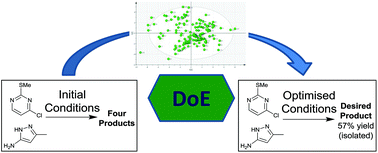The application of design of experiments (DoE) reaction optimisation and solvent selection in the development of new synthetic chemistry†
Abstract
This article outlines the benefits of using ‘Design of Experiments’ (DoE) optimisation during the development of new synthetic methodology. A particularly important factor in the development of new chemical reactions is the choice of solvent which can often drastically alter the efficiency and selectivity of a process. Whilst solvent optimisation is usually done in a non-systematic way based upon a chemist's intuition and previous laboratory experience, we illustrate how optimisation of the solvent for a reaction can be carried out by using a ‘map of solvent space’ in a DoE optimisation. A new solvent map has been developed specifically for optimisation of new chemical reactions using principle component analysis (PCA) incorporating 136 solvents with a wide range of properties. The new solvent map has been used to identify safer alternatives to toxic/hazardous solvents, and also in the optimisation of an SNAr reaction.


 Please wait while we load your content...
Please wait while we load your content...